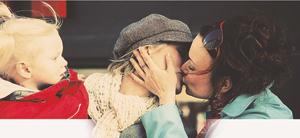When Leslie Ann Coles first set out to create the Female Eye Film Festival, she intended it to be a weekend-long event at Toronto’s Bloor Cinema.
Ten years later, it has grown into an annual international celebration of female directors and women in the film industry.
“I was attending an international film festival with my own film and hanging around the international film scene,” Coles says. “Women were a minority among the directors at these events. I started asking myself, Why are there so few women directors? Are they just not getting programmed?”
While the genesis of Coles’ festival stemmed from a lack of exposure for films directed by women, she assures potential viewers that men are not excluded. However, most of the films were directed by women.
Coles says the toughest aspect of running a female-focused film festival is acquiring funding.
“The films are there; the directors, the support from local community and industry is there. It’s just money,” she says. “Whichever way the cat swings, arts councils are great. Ontario Arts Council has been a big support, but it’s a subjective process. It could be looked on favourably one year, then maybe it’s discriminatory that it’s an all-female festival.”
Coles believes that as long as women have to fight harder, stronger and faster to be recognized as directors and get funding, the Female Eye Film Festival will exist. Every year the submission pile increases.
“Women deal with issues differently. They treat content differently,” she says. “With sex and violence, nothing is gratuitous. Often it’s what you don’t say that’s compelling. You see women of all ages in their films. Women directors often have a female protagonist. These are stories close to women’s hearts.”
This year’s festival honours director Barbara Willis-Sweete with a best-in-the-business tribute, as well as American director Nancy Savoca. Aboriginal filmmaker Alanis Obomsawin is also being honoured with an inaugural lifetime achievement award.
The festival’s gay and lesbian picks include Danish filmmaker Pernille Rübner-Petersen’s short A Child. It portrays lesbian couple Charlotte and Tjili, who live together until Tjili declares she wants to have children.
Lori Young’s Dit is ek (This Is Me), is set in Cape Town, South Africa, and follows Tarryn Langton, a lesbian police detective who investigates a corrective rape/murder and then falls victim to the same crime.
“We have a lot of late-night suspense thrillers and some really gritty experimental films that deal with mental health,” Coles says. “Women make films that blow up. They don’t always make romantic comedies. Women work in all genres.
“Really, in its heart, I hope Female Eye Film Festival dispels the myth that women directors and creators make it for a female audience. They make it for an audience. Bridesmaids is a good example. The Piano, too. The Hurt Locker wasn’t a chick flick.”

 Why you can trust Xtra
Why you can trust Xtra


